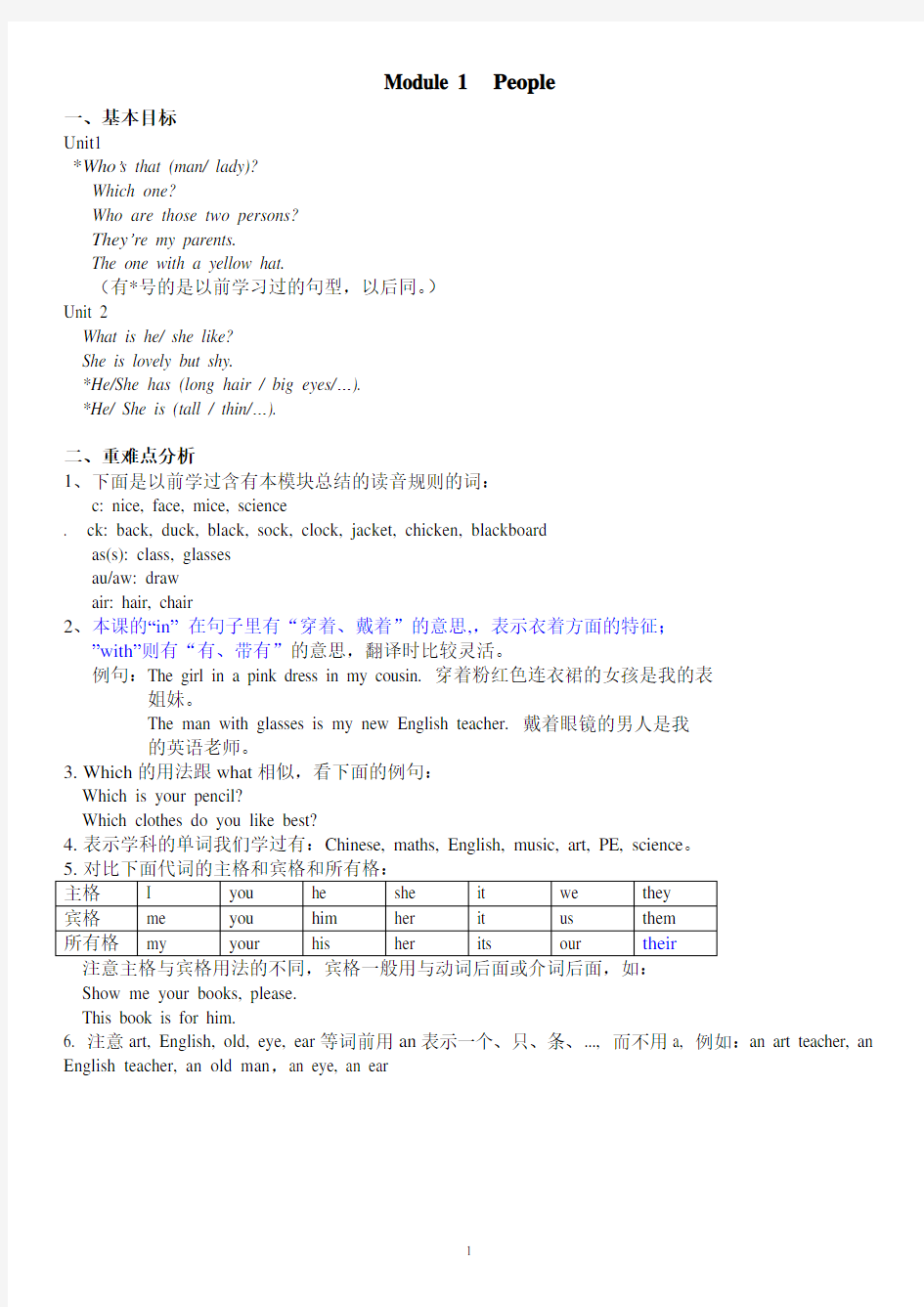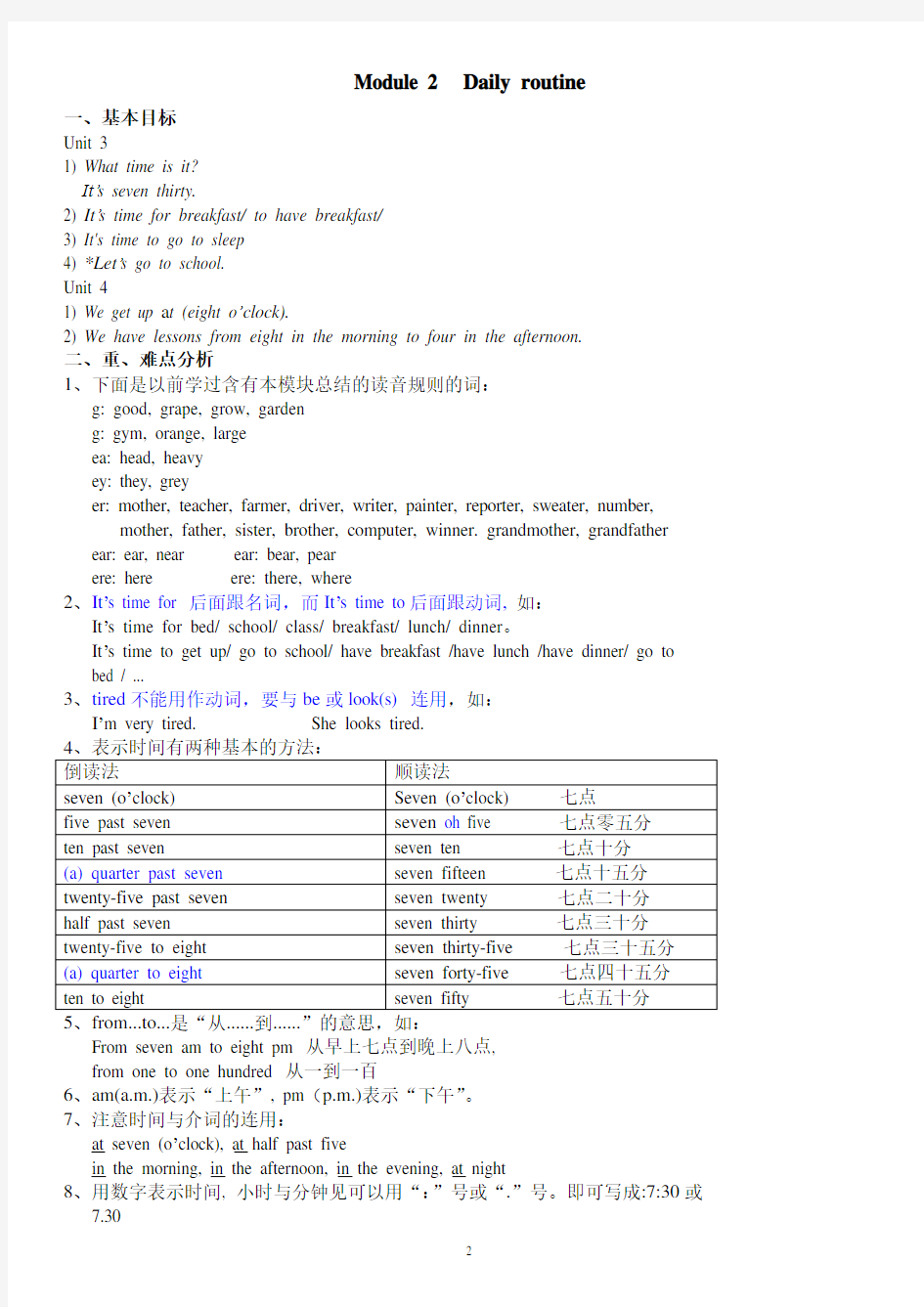广州教科版英语四年级下册全册知识点归纳


Module 1 People
一、基本目标
Unit1
*Who’s that (man/ lady)?
Which one?
Who are those two persons?
They’re my parents.
The one with a yellow hat.
(有*号的是以前学习过的句型,以后同。)
Unit 2
What is he/ she like?
She is lovely but shy.
*He/She has (long hair / big eyes/…).
*He/ She is (tall / thin/…).
二、重难点分析
1、下面是以前学过含有本模块总结的读音规则的词:
c: nice, face, mice, science
. ck: back, duck, black, sock, clock, jacket, chicken, blackboard
as(s): class, glasses
au/aw: draw
air: hair, chair
2、本课的“in”在句子里有“穿着、戴着”的意思,,表示衣着方面的特征;
”with”则有“有、带有”的意思,翻译时比较灵活。
例句:The girl in a pink dress in my cousin. 穿着粉红色连衣裙的女孩是我的表
姐妹。
The man with glasses is my new English teacher. 戴着眼镜的男人是我
的英语老师。
3.Which的用法跟what相似,看下面的例句:
Which is your pencil?
Which clothes do you like best?
4.表示学科的单词我们学过有:Chinese, maths, English, music, art, PE, science。
5.对比下面代词的主格和宾格和所有格:
主格I you he she it we they
宾格me you him her it us them
所有格my your his her its our their
注意主格与宾格用法的不同,宾格一般用与动词后面或介词后面,如:
Show me your books, please.
This book is for him.
6. 注意art, English, old, eye, ear等词前用an表示一个、只、条、..., 而不用a, 例如:an art teacher, an English teacher, an old man,an eye, an ear
Module 2 Daily routine
一、基本目标
Unit 3
1) What time is it?
It’s seven thirty.
2) It’s time for breakfast/ to have breakfast/
3) It's time to go to sleep
4) *Let’s go to school.
Unit 4
1) We get up a t (eight o’clock).
2) We have lessons from eight in the morning to four in the afternoon.
二、重、难点分析
1、下面是以前学过含有本模块总结的读音规则的词:
g: good, grape, grow, garden
g: gym, orange, large
ea: head, heavy
ey: they, grey
er: mother, teacher, farmer, driver, writer, painter, reporter, sweater, number, mother, father, sister, brother, computer, winner. grandmother, grandfather ear: ear, near ear: bear, pear
ere: here ere: there, where
2、It’s time for 后面跟名词,而It’s time to后面跟动词,如:
It’s time for bed/ school/ class/ breakfast/ lunch/ dinner。
It’s time to get up/ go to school/ have breakfast /have lunch /have dinner/ go to bed / ...
3、tired不能用作动词,要与be或look(s) 连用,如:
I’m very tired. She looks tired.
4、表示时间有两种基本的方法:
倒读法顺读法
seven (o’clock) Seven (o’clock) 七点
five past seven seven oh five 七点零五分ten past seven seven ten 七点十分(a) quarter past seven seven fifteen 七点十五分twenty-five past seven seven twenty 七点二十分half past seven seven thirty 七点三十分twenty-five to eight seven thirty-five 七点三十五分(a) quarter to eight seven forty-five 七点四十五分ten to eight seven fifty 七点五十分5、from...to...是“从......到......”的意思,如:
From seven am to eight pm 从早上七点到晚上八点,
from one to one hundred 从一到一百
6、am(a.m.)表示“上午”, pm(p.m.)表示“下午”。
7、注意时间与介词的连用:
at seven (o’clock), at half past five
in the morning, in the afternoon, in the evening, at night
Module 3 Days of the week
一、基本目标
Unit 5
1) What day is it today?
Is it Monday?
It’s Sunday.
2) What’s your favourite day?/ Which day do you like best?
Unit 6
1) What do you usually do (after school)?
*2) Do you usually/ often/ sometimes (take exercise on Monday)?
二、重、难点分析
1、下面是以前学过含有本模块总结的读音规则的词:
tr: tree, trousers (注意区别于ch和ts的发音)
dr: draw, drive, driver, hundred (注意区别于g和j的发音)
nk: pink, thank,
wr::wrong, write, writer
i: hi
2、周日的名称可以缩写:
Sunday--Sun. Monday--Mon. Tuesday--Tue. Wednesday--Wed.
Thursday--Thur. Friday--Fri. Saturday--Sat.
3.用favourite可以引出下面的句子:
What’s your favourite day/ sport/ colour/ subject/...
4、日期与与介词的连用常用on (表示在......日或某天的一部分),如:
on Sunday, on Saturday morning, on Wednesday afternoon。对比:
at six o’clock, at half past ten
in the morning, in the afternoon, in the evening, at night, at noon
5、Like 有两种意思,一是“喜欢”,二是“象”:
I like reading. 我喜欢阅读。I want to be a painter like my father.
课本里的句子:
I always help me father do housework? 我总是帮助我的妈妈做家务。
Like what? 比如说帮什么?
6、英语中表示频度的副词有:
always(总是)-usually(通常)-often(经常)-sometimes(有时)-seldom(极少)-never (从不)
这些词长放在在行为动词的前面或be动词的后面,如:
I always help my parents after school. I am always here on Sunday.
有时放在句前或后面,如:
I go there very often.
Sometimes I go shopping with my parents.
7、两个动册间后一个动词通常用不定式to (d0)..., 如:
I want to buy a T-shirt. I like to play music. I use this pen to write.
但help后一般不加to, 如:
I usually help mum do housework.
8.He / She likes doing sth. something一般指某种事情
He likes to do sth. Something一般指具体的事情
9. help sb (to) do sth. 可省to
Module 4 Activity
一、基本目标
Unit 7
*1) What do you often do on Sunday/ Saturday// after school; when you have free time)?
I often listen to music/ play computer games, have sports/…
*2) Do you always watch TV in the evening?
Yes, I do. No, I don’t.
3)Shall we (watch a cartoon)
Unit 8
1) What are you doing?
I’m read ing / playing computer games.
2) Are you play ing computer games?
Yes, I am./ No, I’m not.
二、重、难点分析
1、下面是以前学过含有本模块总结的读音规则的词:
o: come, does, love, front, Monday
ou: house, mouse, mouth, blouse, trousers, playground
ou: young, touch
oo: too, pool, school
oo: cook, book, look, good
oy: boy, toy
old: old
oor: door, floor
2、注意:an interesting book (用an, 不用a);
3、one of you 你们中的一个人的意思。同样可以说:
one of them, one of us, one of the pictures, one of the toys,...
4、用when引导的句子表示时间,可以有良种写法:
1) I often clean my house when I have free time.
2) When I have free time, I often clean my house.
5、现在进行时的动词-ing形式构成是:
规则:例子:
一般情况下在动词原形后加ing sing--singing play--playing
read--reading fly--flying
look--looking go--going
以不发音e结尾的单词,去加ing have--having. write--writing,
come--coming dance--dancing
use--using make--making
重读闭音节的单词双写最后一个字母加ing put--putting run--running swim--swimming get--getting
6、现在进行时的句子的肯定句结构:
肯定式:
I am
You are He /She is do ing... play ing ... read ing ...
否定式
I am not
You are not (aren’t)
He /She is not (isnt) We are are not (aren’t) They are are not (aren’t) do ing... play ing ... read ing ... ...
一般疑问式:
Am I Are you Is he/she Are we Are they do ing...? play ing ...? read ing ...? ...
认识下面现在进行时的特殊疑问句:
What are you doing?
Where is he read ing?
Who is clea ning the house?
7、通过比较加深对两种时态的认识:
They often play computer games.
They are playing computer games.
I often help my mother do housework.
I am helping my mother do housework.
8. an interesting book教如何区分a, an的用法时可以不将规律,用习惯来解释。
9、when 引导的状语从句不做拓展。
Module 5 Sports
一、基本目标
Unit 9
1) I think they are playing chess/ skating/...
2) It looks fun
Unit 10
1) What’s your favourite sport?
2)What do you like doing?
I like swimm ing/ running/…(best).
二、重难点分析
1、下面是以前学过含有本模块总结的读音规则的词:
ph: photo
u: ruler. blue
u: put
uy: buy guy
2、some of them他们中的一些人。同样可以说:some of us, some of you, some of
the pictures, some of the dogs...
3、比较:I like doing something 我喜欢做某类事情。
I like to do something. 我喜欢做某件(具体)的事情。
4、have a look at...看一看......
May I have a look at your photos? 我可以看一看你的照片吗?
5.I like the water. 这(那)些的水(water)是特指的,如果说I like water. 意思是”我喜欢水(泛指水)。
6.I like swimming best. 我最喜欢游泳。请记注I like something/ doing something
best.是一个句型。
7、“流旱冰”可以用skate, skate还可以做“冰鞋:解释。
8、注意play football / basketball / volleyball / tennis / table tennis等
do the high jump / the long jump
9、It looks fun. 整局句学学习,作习惯用语掌握。
Module 6 Celebrations
一、基本目标
Unit 11
1) What’s going on?
2) I was born in January/ February/...
Unit 12
3 It’s November/ December/... already.
4) Spring Festival Christmas/... is coming soon.
5) Dad/ My cousin/... likes dressing as Father Christmas/ Mickey Mouse/ Monkey
King/...
二、重、难点分析
1、下面是以前学过含有本模块总结的读音规则的词:
qu: quarter
ts: let’s what’s
ds: beds hands heads
y: yes you your young yellow
y: dirty very party baby body many study pretty heavy lovely
story funny really library everything
2、all the present 所有的礼物,同样可以说all the books, all the crayons......
比较:one you/us/them
two of you/us/them
all of you/us/them
3、月份与介词”在”的连用常用in, 如:in May, in October,... 对比:
at six o’clock, at half past ten
on Sunday, on Tuesday afternoon
in the morning, in the afternoon, in the evening
at night, at noon
4、lots of相当于a lot 很多。
5、was是is和am的过去式, 句型:
I /He/She was born...
例句:I was born in Beijing. 我在北京出生。
He was born in December. 他十二月份出生。
6、was born作词组处理,不拓展。
